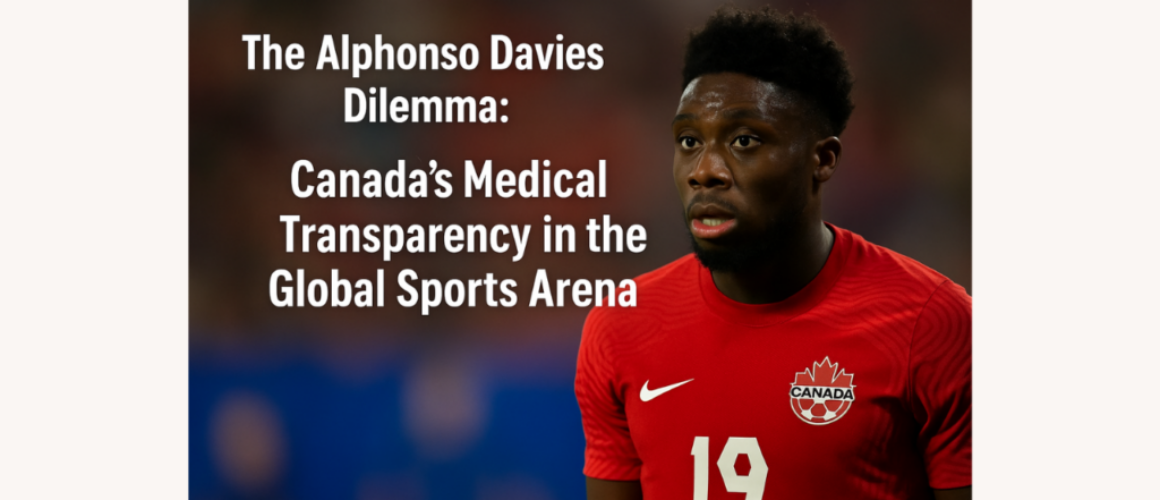The Alphonso Davies Dilemma: Canada’s Medical Transparency in the Global Sports Arena

Munich, Germany & Toronto, ON – A high-stakes dispute has erupted between Bayern Munich and Canada Soccer over the handling of a serious injury to Alphonso Davies, Canada’s football icon and one of the world’s most electrifying left-backs. After suffering a reported ACL tear during Canada’s friendly against the U.S. Men’s National Team, Davies’ club is accusing Canada Soccer of withholding critical medical information.
At face value, it’s a club-vs-country standoff—common in elite sports. But this incident goes far beyond one player or one diagnosis. It shines a spotlight on deeper systemic questions: How should national federations handle elite athlete medical disclosures? Who has the final say over treatment? And where does privacy end and club interest begin?
The Spark: A Broken Communication Chain
The clash began when Bayern’s medical staff requested a full diagnostic report—including MRI scans, rehabilitation timelines, and physician notes. Canada Soccer reportedly responded with a summary report, citing medical confidentiality and athlete consent requirements.
Frustrated, Bayern declined a proposed in-person consultation in Toronto, calling the federation’s disclosures “incomplete and insufficient for international athletic governance.” Sources within Allianz Arena suggest the club is now considering legal options or even petitioning FIFA for new athlete release terms during national duty.
Canada Soccer, for its part, maintains that all actions were taken with Davies’ consent and in accordance with Canadian healthcare law.
Athlete Autonomy vs. Institutional Pressure
The controversy raises a fundamental ethical question: Who owns the body of a professional athlete? In European clubs, especially in Germany and Spain, it’s standard practice for clubs to directly manage or even override national medical protocols. In Canada, where patient consent and privacy laws are more rigidly enforced, even high-profile athletes retain control over their medical data.
This difference has triggered a cross-cultural misunderstanding. Davies, currently recovering in Canada under close private supervision, has not yet commented publicly—but insiders report he’s caught in a difficult tug-of-war between loyalty to his nation and obligation to his club.
Experts suggest this case could become a landmark test case for international sports governance. Legal scholar Dr. Émilie Lefebvre of McGill University notes:
“We are entering an era where global sport is regulated not just by FIFA or the IOC, but by conflicting national privacy frameworks. The Davies case may set legal precedent.”
Canada’s Reputation at Risk?
While Canada Soccer is not accused of malpractice, the incident could have broader implications. Global clubs might grow more hesitant to release players for international duty—especially to federations that follow strict patient consent frameworks. That could hamper Canada’s preparation for both the 2026 FIFA World Cup (co-hosted by Canada) and future Olympic qualifiers.
Already, there are rumblings that European clubs are discussing an informal blacklist for countries where “transparency is not guaranteed”—a move that would disproportionately affect emerging football nations like Canada.
Domestically, pressure is mounting for Canada Soccer to standardize international injury protocols and establish a liaison mechanism between club and national physicians. Without such reforms, Canada risks reputational damage at a time when it is finally being taken seriously on the global pitch.
A Larger Pattern: National Teams vs. Club Capitalism
This isn’t just Canada’s problem. The Alphonso Davies incident reflects a broader tension in world football: the growing commercialization of player health. With players now considered “multi-million dollar assets,” clubs often treat injuries like financial events rather than human crises.
In such a system, national teams—especially from smaller federations—are seen as risk multipliers, not partners. Canada, by upholding a more humane, privacy-forward stance, finds itself philosophically at odds with Europe’s win-at-all-costs machinery.
The Road Ahead
What happens next could redefine global norms. If Davies’ recovery stalls or tensions escalate, Canada Soccer may be forced to submit to external review or renegotiate international player handling agreements.
Alternatively, this moment could be Canada’s opportunity to lead. By advocating for athlete-centered medical policy, Canada can not only protect its stars but also promote a healthier, more ethical model for global sports relations.
As fans, policymakers, and clubs watch closely, one thing is clear: this isn’t just about Alphonso Davies’ knee. It’s about how the world treats its most valuable athletes when their bodies are on the line.